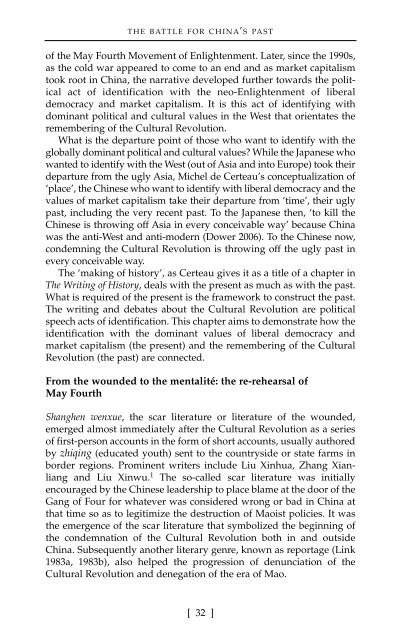Battle for China's Past : Mao and the Cultural Revolution
Battle for China's Past : Mao and the Cultural Revolution
Battle for China's Past : Mao and the Cultural Revolution
Create successful ePaper yourself
Turn your PDF publications into a flip-book with our unique Google optimized e-Paper software.
THE BATTLE FOR CHINA’ S PAST<br />
of <strong>the</strong> May Fourth Movement of Enlightenment. Later, since <strong>the</strong> 1990s,<br />
as <strong>the</strong> cold war appeared to come to an end <strong>and</strong> as market capitalism<br />
took root in China, <strong>the</strong> narrative developed fur<strong>the</strong>r towards <strong>the</strong> political<br />
act of identification with <strong>the</strong> neo-Enlightenment of liberal<br />
democracy <strong>and</strong> market capitalism. It is this act of identifying with<br />
dominant political <strong>and</strong> cultural values in <strong>the</strong> West that orientates <strong>the</strong><br />
remembering of <strong>the</strong> <strong>Cultural</strong> <strong>Revolution</strong>.<br />
What is <strong>the</strong> departure point of those who want to identify with <strong>the</strong><br />
globally dominant political <strong>and</strong> cultural values? While <strong>the</strong> Japanese who<br />
wanted to identify with <strong>the</strong> West (out of Asia <strong>and</strong> into Europe) took <strong>the</strong>ir<br />
departure from <strong>the</strong> ugly Asia, Michel de Certeau’s conceptualization of<br />
‘place’, <strong>the</strong> Chinese who want to identify with liberal democracy <strong>and</strong> <strong>the</strong><br />
values of market capitalism take <strong>the</strong>ir departure from ‘time’, <strong>the</strong>ir ugly<br />
past, including <strong>the</strong> very recent past. To <strong>the</strong> Japanese <strong>the</strong>n, ‘to kill <strong>the</strong><br />
Chinese is throwing off Asia in every conceivable way’ because China<br />
was <strong>the</strong> anti-West <strong>and</strong> anti-modern (Dower 2006). To <strong>the</strong> Chinese now,<br />
condemning <strong>the</strong> <strong>Cultural</strong> <strong>Revolution</strong> is throwing off <strong>the</strong> ugly past in<br />
every conceivable way.<br />
The ‘making of history’, as Certeau gives it as a title of a chapter in<br />
The Writing of History, deals with <strong>the</strong> present as much as with <strong>the</strong> past.<br />
What is required of <strong>the</strong> present is <strong>the</strong> framework to construct <strong>the</strong> past.<br />
The writing <strong>and</strong> debates about <strong>the</strong> <strong>Cultural</strong> <strong>Revolution</strong> are political<br />
speech acts of identification. This chapter aims to demonstrate how <strong>the</strong><br />
identification with <strong>the</strong> dominant values of liberal democracy <strong>and</strong><br />
market capitalism (<strong>the</strong> present) <strong>and</strong> <strong>the</strong> remembering of <strong>the</strong> <strong>Cultural</strong><br />
<strong>Revolution</strong> (<strong>the</strong> past) are connected.<br />
From <strong>the</strong> wounded to <strong>the</strong> mentalité: <strong>the</strong> re-rehearsal of<br />
May Fourth<br />
Shanghen wenxue, <strong>the</strong> scar literature or literature of <strong>the</strong> wounded,<br />
emerged almost immediately after <strong>the</strong> <strong>Cultural</strong> <strong>Revolution</strong> as a series<br />
of first-person accounts in <strong>the</strong> <strong>for</strong>m of short accounts, usually authored<br />
by zhiqing (educated youth) sent to <strong>the</strong> countryside or state farms in<br />
border regions. Prominent writers include Liu Xinhua, Zhang Xianliang<br />
<strong>and</strong> Liu Xinwu. 1 The so-called scar literature was initially<br />
encouraged by <strong>the</strong> Chinese leadership to place blame at <strong>the</strong> door of <strong>the</strong><br />
Gang of Four <strong>for</strong> whatever was considered wrong or bad in China at<br />
that time so as to legitimize <strong>the</strong> destruction of <strong>Mao</strong>ist policies. It was<br />
<strong>the</strong> emergence of <strong>the</strong> scar literature that symbolized <strong>the</strong> beginning of<br />
<strong>the</strong> condemnation of <strong>the</strong> <strong>Cultural</strong> <strong>Revolution</strong> both in <strong>and</strong> outside<br />
China. Subsequently ano<strong>the</strong>r literary genre, known as reportage (Link<br />
1983a, 1983b), also helped <strong>the</strong> progression of denunciation of <strong>the</strong><br />
<strong>Cultural</strong> <strong>Revolution</strong> <strong>and</strong> denegation of <strong>the</strong> era of <strong>Mao</strong>.<br />
[ 32 ]
















